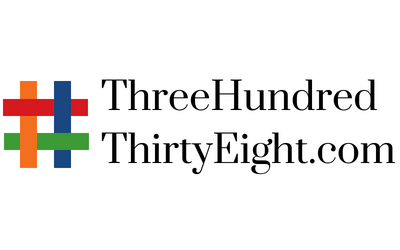By Laura Krizan
The results of this poll were based on an interactive voice response survey conducted Friday March 15thand Monday March 17th, 2019. A total of 1003 individuals completed the first question of the survey and 715 completed the entire survey. The survey was designed to aid in the development of the Region of Waterloo’s Strategic Plan for 2019-2023. The Strategic Plan helps Council and staff set priorities and achieve goals, all while keeping the community’s concerns and suggestions in mind. A significant proportion of the Strategic Plan includes hearing input from the public and listening to comments, concerns, etc. so that the Region can set appropriate priorities. The questions in the survey are also aimed to help the Region of Waterloo during the drafting of its Strategic Plan in the future.
The Strategic Plan has 5 focus areas: Thriving Economy, Sustainable Transportation, Environment and Sustainable Growth, Healthy, Safe, and Inclusive Communities, and Responsive and Engaging Government Services. The questions that were administered as a part of this survey were developed by ensuring that these focus areas were kept in mind.
The first question on the survey asked participants about the level of confidence they have in their local government. The results are shown in the chart below, indicating that a majority of citizens (56%) are confident in the regional government to some degree (including somewhat confident, confident, and very confident levels).
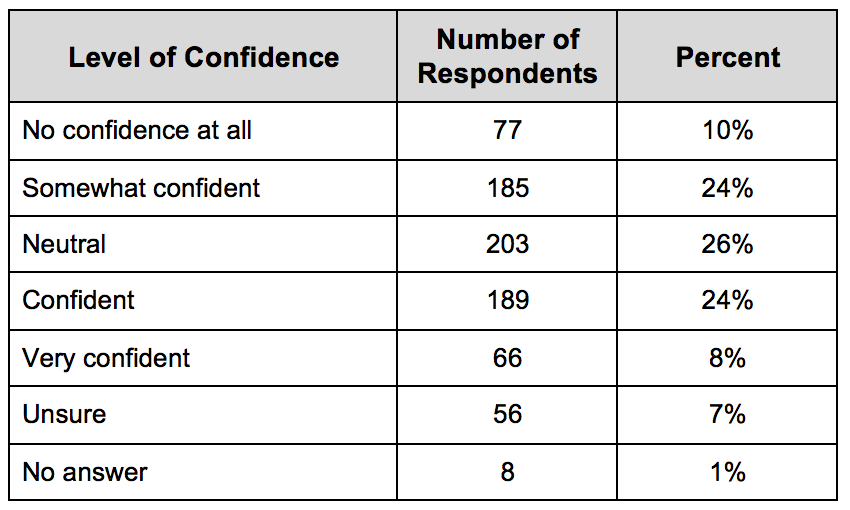
The survey was a way to analyze the top priorities that need to be set by the Region of Waterloo for the development of their Strategic Plan. Respondents were asked what they think the biggest priority in Waterloo Region is that the regional government should address. The results, as shown in the chart below, have been ranked based on the number of respondents choosing a given category as their top priority. The top 3 priorities are: 1) Supporting the development of affordable housing 2) Managing growth, 3) Protecting the environment.
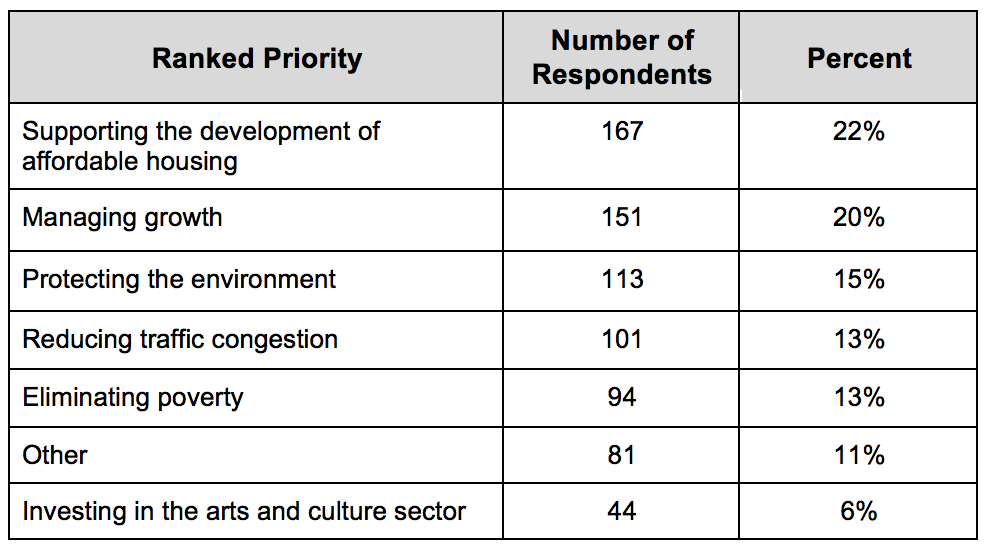
A significant component of the Strategic Plan focuses on the services that are delivered by the Region of Waterloo, such as public transportation, waste collection, and so forth. In order to better understand the preferences among citizens living in the Region of Waterloo in relation to the delivery of services, the survey asked: “Regional Government must balance the cost of delivering services with taxation. Which of the following would you most prefer for property taxes in Waterloo Region?”
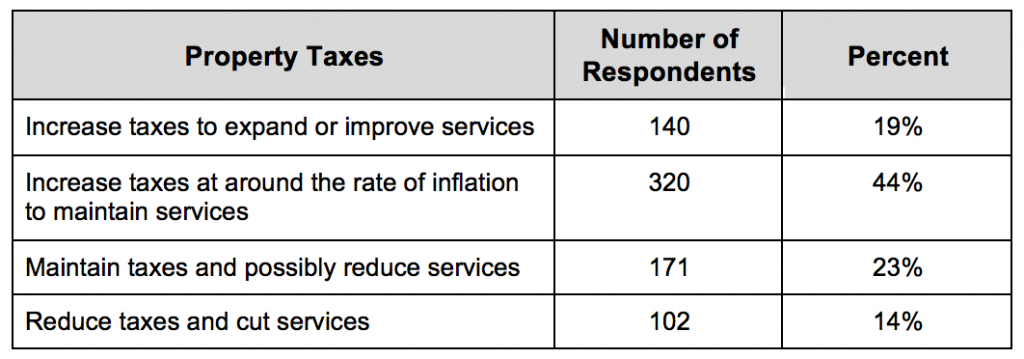
Results indicated that 19% preferred increasing taxes to improve services while 14% preferred having property taxes decreased. 23% preferred keeping taxes that same and possibly reducing services. The largest proportion (44%) preferred having taxes increased with the rate of inflation and maintaining current services.
This survey was also used to analyze the best ways and platforms to receive public input in the future. Respondents were asked, “If the Region of Waterloo wanted to gather public input or engage you on major issues or decisions, what are the best ways?” It was found that the best ways to gather public input or engage on major issues/decisions in the region are: 1) Online Survey, 2) Social Media, and 3) Telephone Survey. All other options that were included in the survey are listed below.
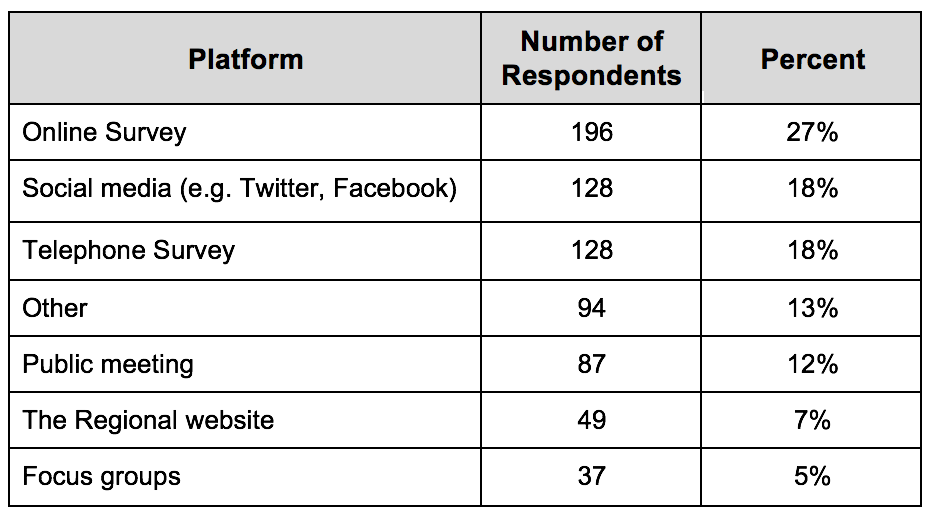
Ultimately, the survey helped to provide the Region of Waterloo with important information that can be used during the development of the 2019-2023 Strategic Plan. A total of 9 questions were administered, yet the responses that have been analyzed above highlight the most critical results that will be taken into consideration by the Region.
…
Survey Details
The Interactive Voice Response (IVR) survey was conducted by Laura Krizan; Abby Schlueter; Andrea Volford, and Professor Anthony Piscitelli on March 15th and March 17th, 2019. Throughout the development of the survey, the students worked alongside Lorie Fioze, Manager of Strategic Planning and Strategic Initiatives. The questions that were formulated for the survey focused on supporting the development of the Region of Waterloo’s strategic plan. The survey was funded by the Region of Waterloo to support this initiative.
Sampling Approach
The sample size was created by randomly selecting Waterloo Region landlines listed in a digital phone book. A sample of likely cellphone numbers was added by randomly selecting phone numbers that were originally assigned to Waterloo Region, according to the Canadian Numbering Administrator. Sampling errors exists as a result of this approach due to the mismatch created by the random dialling of phone numbers as opposed to randomly sampling actual Waterloo Region residents.
Response rate
The survey called 46,912 live lines. The response rate was 1.5%, which is based on 715 respondents who completed the entire survey. All 788 respondents who answered the first three questions were included in the results. It is worth noting that 215 (21%) respondents were not eligible to participate due to being under 18 or not living in Waterloo Region.
Weights
Results of this survey have been weighted by age, gender, and city/township according to the 2016 census. The full weights are posted along with the raw data on OpenIcpsr.org and can be found by visiting: http://doi.org/10.3886/E110225V1
Margin of Error
Results are considered accurate +/-3.7%, 19 times out of 20. The margin of error on subsamples is higher.
Raw Data
Raw survey data is available on OpenIcpsr.org. The data can be found at: http://doi.org/10.3886/E110225V1
Disclaimer
The survey results will exhibit sampling error as a result of the mismatch created by the random dialling of phone numbers as opposed to randomly sampling actual Waterloo Region residents. This survey was approved by the Conestoga College Research Ethics Board.
